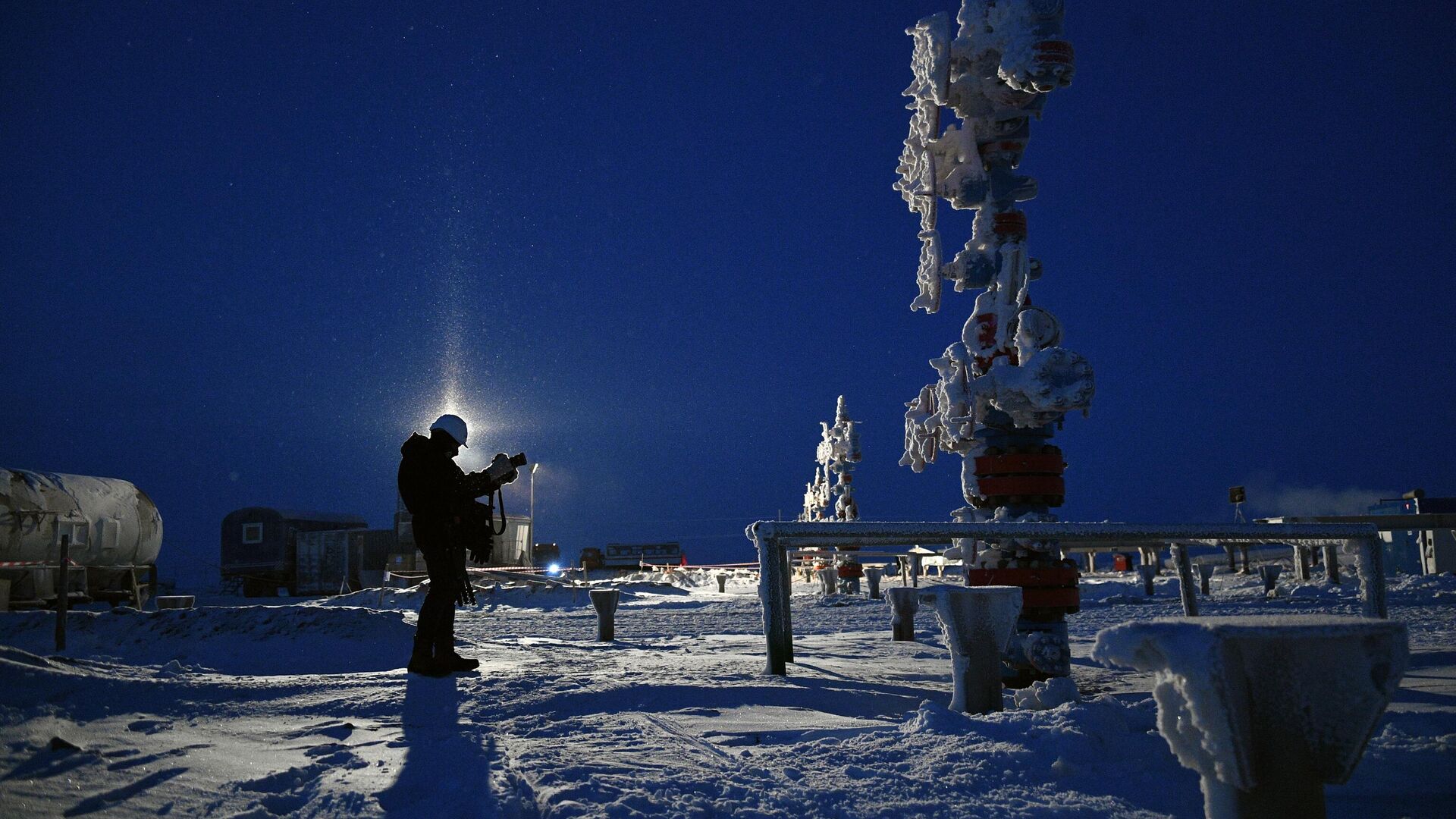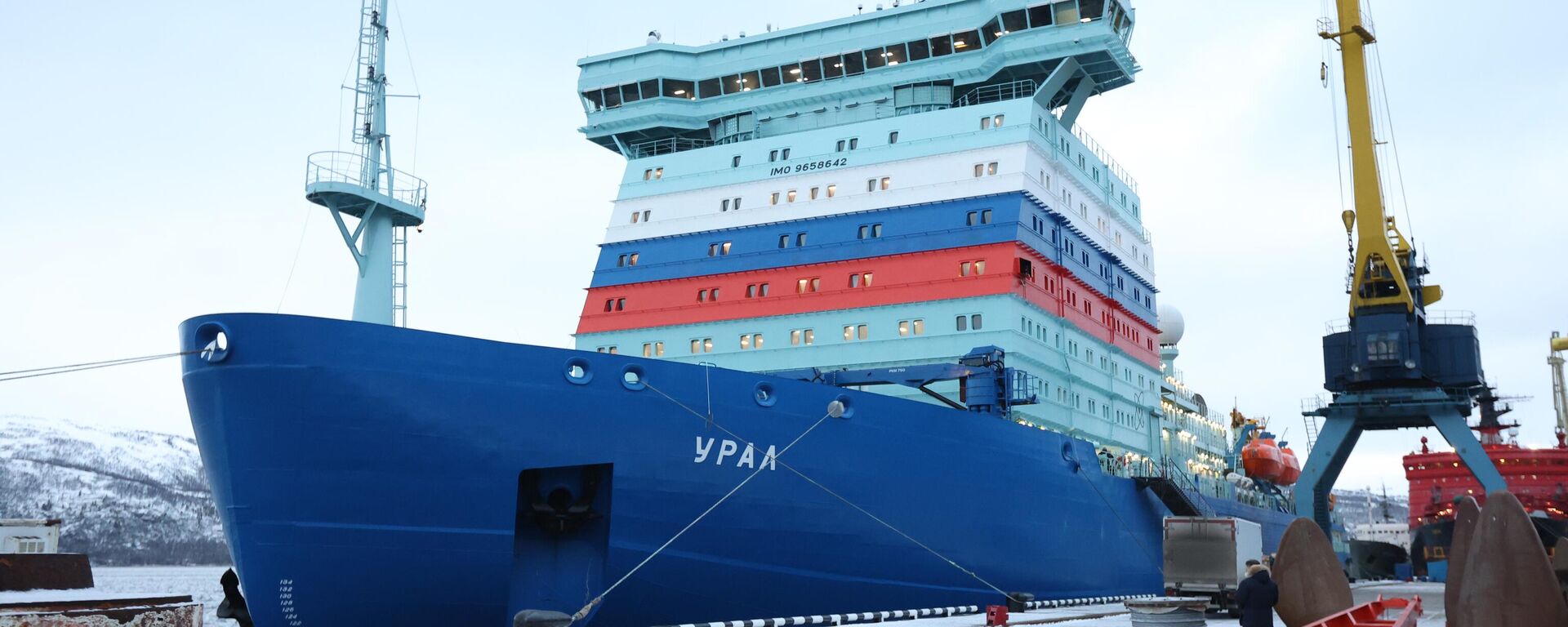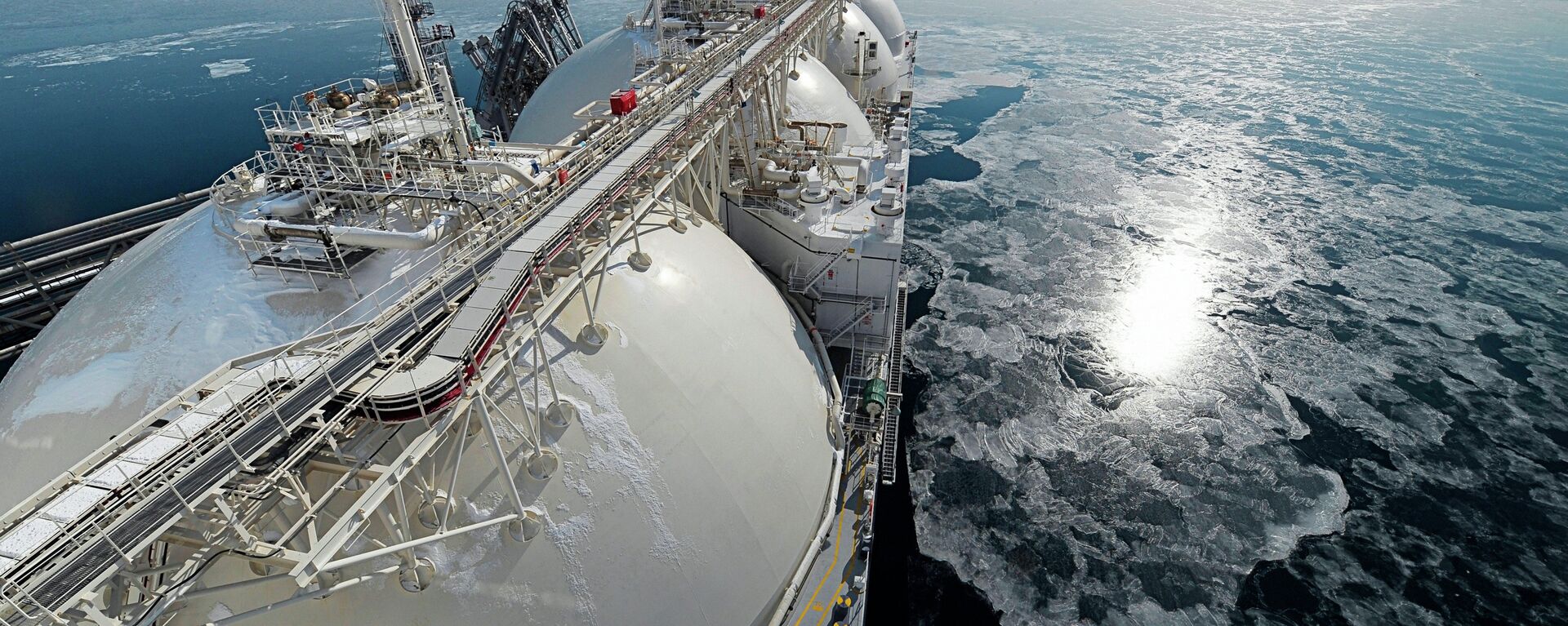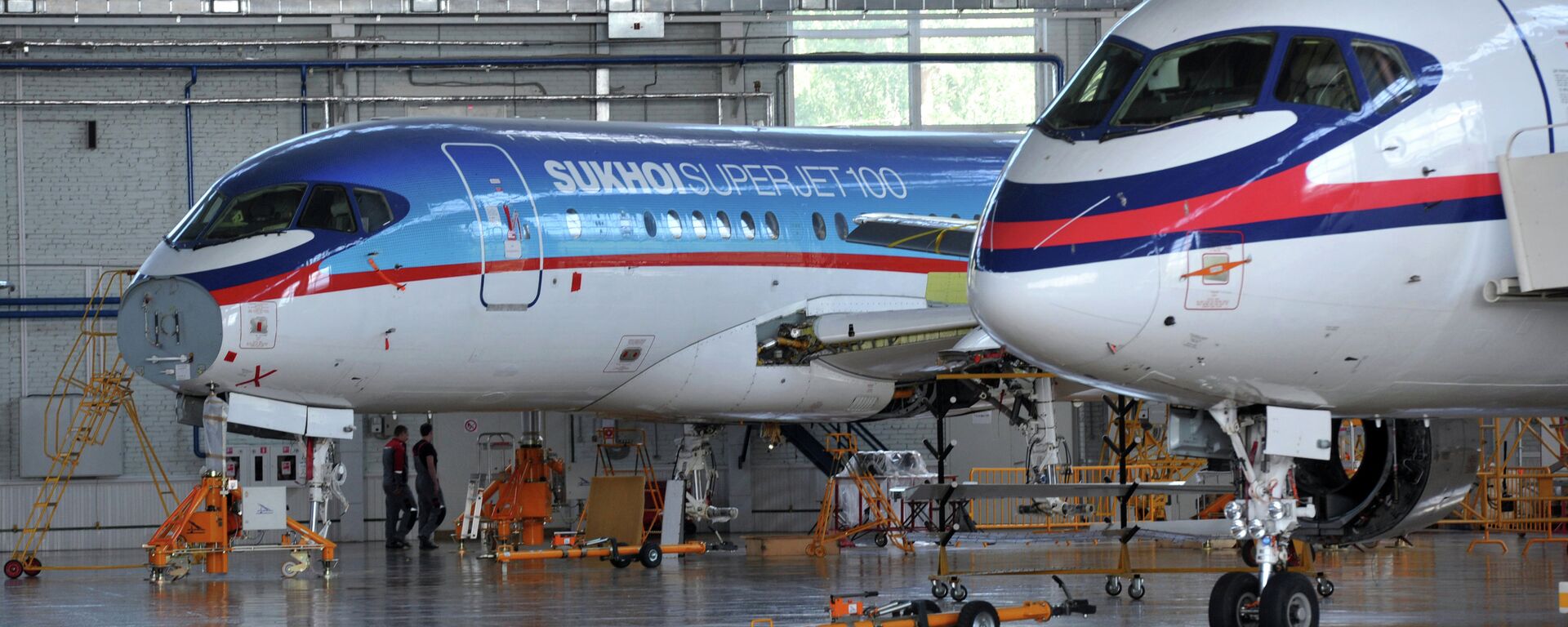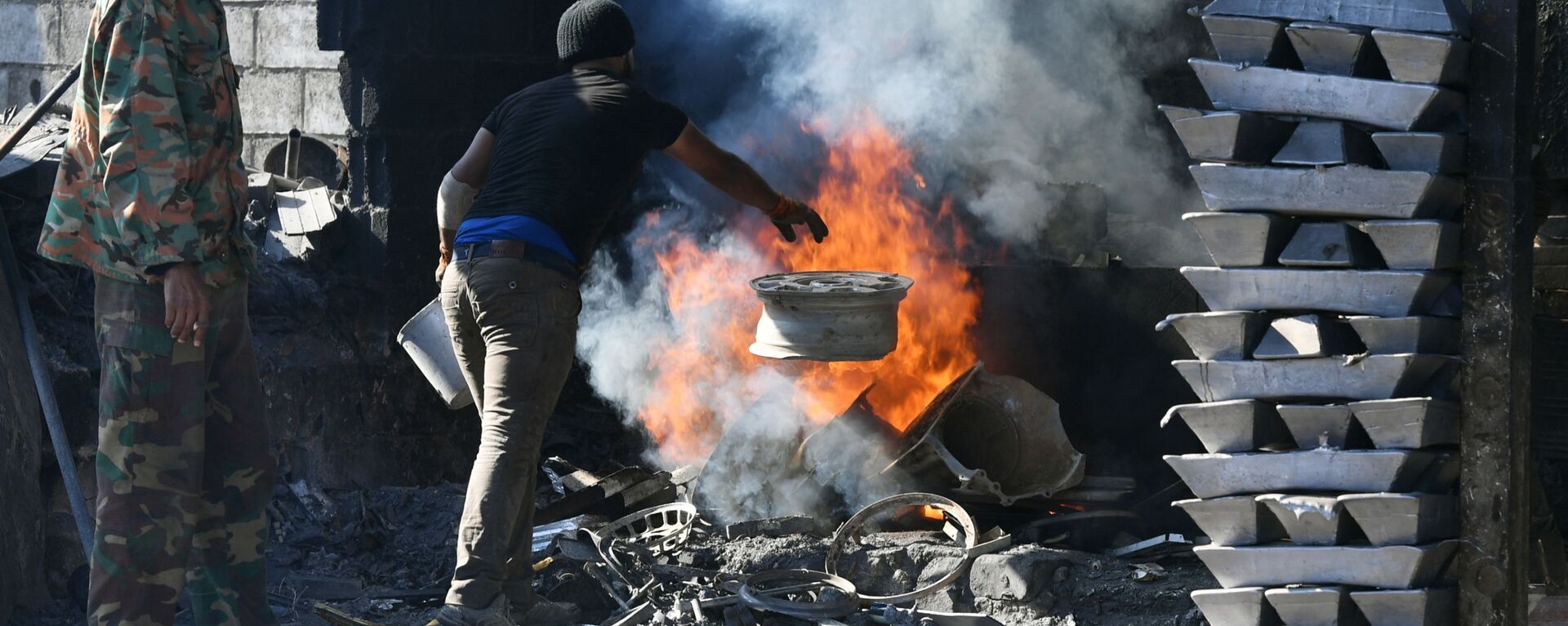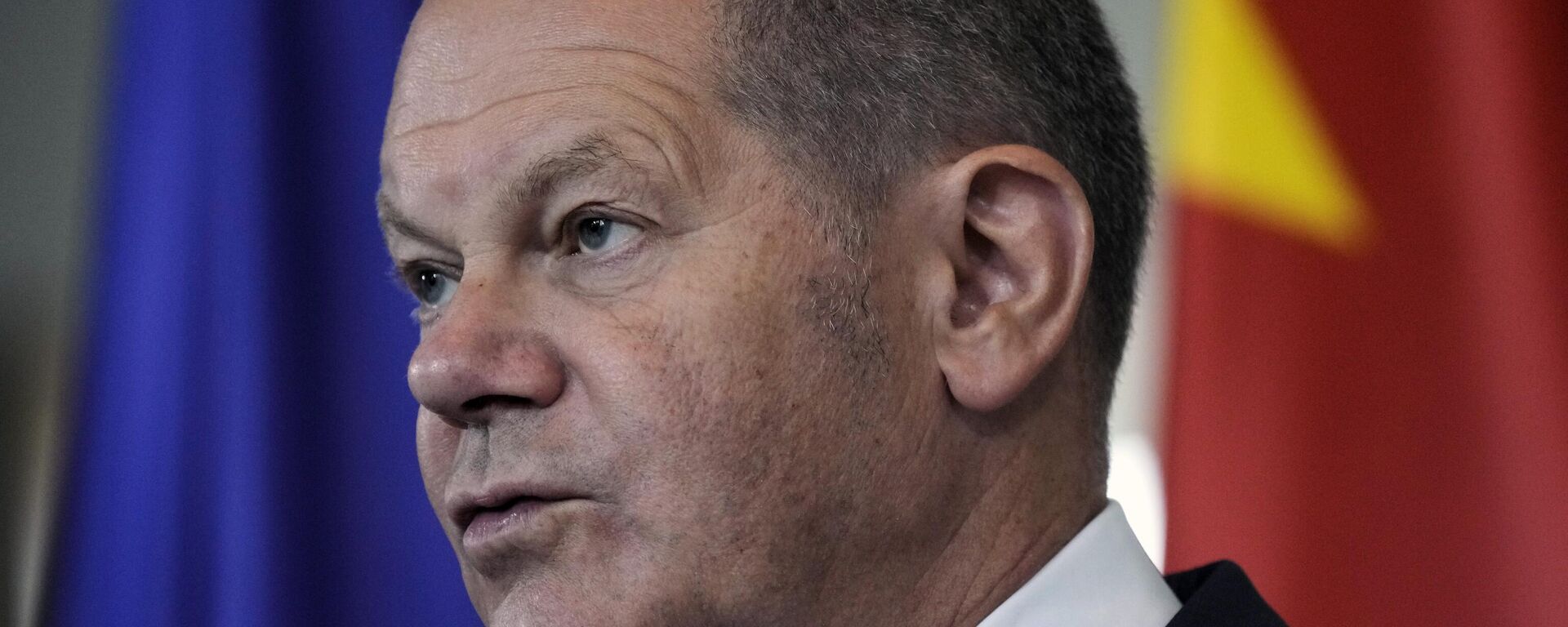https://sputnikglobe.com/20240416/why-us-scheme-to-kill-russias-arctic-lng-2-is-dead-in-the-water-1117963468.html
Why US Scheme to Kill Russia's Arctic LNG 2 is Dead in the Water
Why US Scheme to Kill Russia's Arctic LNG 2 is Dead in the Water
Sputnik International
The US is trying to upend Russia's Arctic LNG 2 project and do whatever it takes to ensure it is "dead in the water." Will Washington succeed in killing Russia's bold energy endeavor?
2024-04-16T19:31+0000
2024-04-16T19:31+0000
2024-04-16T19:31+0000
world
us
world trade organization (wto)
china
arctic
russia
americans
geoffrey pyatt
european union (eu)
novatek
https://cdn1.img.sputnikglobe.com/img/07e8/04/04/1117735509_0:285:3072:2013_1920x0_80_0_0_3cdb6c38c6d734d62fcced1e7f4c4796.jpg
The US plans to use sanctions to asphyxiate the Arctic LNG-2 gas liquefaction project by the Russian company Novatek, the Wall Street Journal reported on Sunday, citing US Assistant Secretary of State for Energy Geoffrey Pyatt.In particular, Washington is trying to prevent Moscow from receiving specialized ice-class tankers needed for transporting liquefied natural gas (LNG). As a result, the South Korean shipbuilder Hanwha Ocean, assigned with building six gas carriers for the project, has ceased cooperation with the customer.Washington's actions go well beyond international law or free market rules, according to Stanislav Mitrakhovich, leading expert of the National Energy Security Foundation and the Financial University under the Government of the Russian Federation.When it comes to Russia's energy trade, the US has a long history of trying to squeeze the nation out of the European market under various pretexts. Eventually, Washington managed to force the EU into severing energy ties with Russia (to Europe's detriment) after the beginning of the special military operation in Ukraine in February 2022.In September 2022, the Nord Stream pipelines carrying natural gas from Russia to Europe were destroyed by "unknown perpetrators", believed by Pulitzer Prize-winning journalist Seymour Hersh to be American and Norwegian operatives acting on Team Biden's orders.Thus, it was hardly surprising that the US emerged as the largest supplier of liquefied natural gas (LNG) to Europe (EU-27 and the UK) in 2022 and 2023, as per the US Energy Information Administration (EIA). Nonetheless, Russia remained Europe's third-largest LNG supplier. According to some estimates, EU imports of Russian LNG have soared by 40% since February 2022.Arctic LNG-2 is Russia's third LNG project. According to expectations, once the endeavor is completed, it would encompass three liquefaction trains producing a total of 19.8 million tons per annum (MTPA) of LNG and up to 1.6 MTPA of stable gas condensate (SGC). Apparently, that does not fit into the US energy market expansion plans.West No Longer TrustworthyRussian President Vladimir Putin repeatedly stated that Western restrictions against Russia violate the principles of the World Trade Organization (WTO) and are unfair methods of competition.According to Mitrakhovich, the US and its allies have demonstrated that they cannot be trusted neither as guarantors of the global economy, nor as standard-bearers, or responsible partners.Western Sanctions Catalyzed Russia's DevelopmentThat said, Western sanctions have triggered Russia's re-industrialization and import substation, Mitrakhovich noted.The expert has no doubts that the work on Arctic LNG-2 will be continued despite Western pressure. It will take time and effort to launch the production of suitable ice-class gas tankers at Russia's shipbuilding facilities instead of those stuck in South Korea, acknowledged Mitrakhovich, adding that Moscow has another technological partner in Asia."I would be glad to see Russian-Chinese cooperation in the field of shipbuilding," the expert said, referring to vast untapped opportunities in the sphere.In addition, there are several alternatives of how to proceed with the project without significant delays, Mitrakhovich continued:Western Options are LimitedOn top of that, the West's capabilities of hindering Russia's flagship LNG projects are limited, according to Sputnik's interlocutor. Even though the EU Parliament has recently approved legal options to block Russian LNG imports to the Old Continent and the US has vowed to introduce new sanctions as well, other global players are continuing to boost energy cooperation with Moscow, the expert stressed.Furthermore, Washington's aggressive actions on the world stage are accelerating the pace of rapprochement between major Eurasian players, the expert highlighted."The Chinese see how unceremoniously the Americans are acting. And in fact, all these American attacks against Russia are being actively studied in China. I think this will ultimately push the Chinese to focus more on cooperation with Russia instead of that with America," he said.The West can throw sand in Russia's gears, but it cannot stop the nation's industrial and technological development based on its vast resources, expertise, and international links, the expert concluded.
https://sputnikglobe.com/20240317/on-thin-ice-us-falling-behind-russia-in-mobility-in-arctic-region-1117374753.html
https://sputnikglobe.com/20230722/second-to-none-arctic-lng-2-to-boost-russias-share-in-world-energy-market-1112063345.html
https://sputnikglobe.com/20240319/russias-sj-100-and-mc-21-aircraft-have-become-flagships-of-import-substitution-1117427842.html
https://sputnikglobe.com/20231221/cargo-traffic-via-northern-sea-route-reaches-record-35mln-tonnes-rosatom-subsidiary-1115730407.html
https://sputnikglobe.com/20240416/sanctions-slapped-on-russian-metals-hurt-west-and-undermine-dollars-dominance-1117964055.html
https://sputnikglobe.com/20240414/scholz-goes-to-beijing-in-vain-attempt-to-drive-wedge-between-russia--china---lawmaker--1117928862.html
china
arctic
russia
Sputnik International
feedback@sputniknews.com
+74956456601
MIA „Rossiya Segodnya“
2024
News
en_EN
Sputnik International
feedback@sputniknews.com
+74956456601
MIA „Rossiya Segodnya“
Sputnik International
feedback@sputniknews.com
+74956456601
MIA „Rossiya Segodnya“
russian arctic lng 2 project, us targets russia's arctic lng 2, us wants to upend russia's arctic lng 2 project, us sanctions to hinder russia's arctic lng 2, russian import substitution effort, russia redirecting energy flows to asia, russian lng exports to eu soared by 40%, russian natural gas, nord stream pipelines
russian arctic lng 2 project, us targets russia's arctic lng 2, us wants to upend russia's arctic lng 2 project, us sanctions to hinder russia's arctic lng 2, russian import substitution effort, russia redirecting energy flows to asia, russian lng exports to eu soared by 40%, russian natural gas, nord stream pipelines
Why US Scheme to Kill Russia's Arctic LNG 2 is Dead in the Water
The US is trying to upend Russia's Arctic LNG 2 project and do whatever it takes to ensure it is "dead in the water." Will Washington succeed in killing Russia's bold energy endeavor?
The US plans to use sanctions to asphyxiate the Arctic LNG-2 gas liquefaction project by the Russian company Novatek, the Wall Street Journal reported on Sunday, citing US Assistant Secretary of State for Energy Geoffrey Pyatt.
In particular, Washington is trying to prevent Moscow from receiving specialized ice-class tankers needed for transporting liquefied natural gas (LNG). As a result, the South Korean shipbuilder Hanwha Ocean, assigned with building six gas carriers for the project, has ceased cooperation with the customer.
Washington's actions go well beyond international law or free market rules, according to Stanislav Mitrakhovich, leading expert of the National Energy Security Foundation and the Financial University under the Government of the Russian Federation.
"The Americans simply use their clout in the world, that is, their financial, political, and technological influence, to force the whole world to act in the way they want," Mitrakhovich clarified.
When it comes to Russia's energy trade, the US has a
long history of trying to squeeze the nation out of the European market under various pretexts. Eventually, Washington managed to force the EU into severing energy ties with Russia (to Europe's detriment) after the beginning of the special military operation in Ukraine in February 2022.
In September 2022,
the Nord Stream pipelines carrying natural gas from Russia to Europe were destroyed by "unknown perpetrators", believed by Pulitzer Prize-winning journalist Seymour Hersh to be American and Norwegian operatives acting on Team Biden's orders.
Thus, it was hardly surprising that the US emerged as the largest supplier of liquefied natural gas (LNG) to Europe (EU-27 and the UK) in 2022 and 2023, as per the US Energy Information Administration (EIA). Nonetheless, Russia remained Europe's third-largest LNG supplier. According to some estimates, EU imports of Russian LNG have soared by 40% since February 2022.
Arctic LNG-2 is Russia's third LNG project. According to expectations, once the endeavor is completed, it would encompass
three liquefaction trains producing a total of 19.8 million tons per annum (MTPA) of LNG and up to 1.6 MTPA of stable gas condensate (SGC). Apparently, that does not fit into the US energy market expansion plans.
West No Longer Trustworthy
Russian President Vladimir Putin repeatedly stated that Western restrictions against Russia violate the principles of the World Trade Organization (WTO) and are unfair methods of competition.
According to Mitrakhovich, the US and its allies have demonstrated that they cannot be trusted neither as guarantors of the global economy, nor as standard-bearers, or responsible partners.
"It's hard to trust the West as a banker because they can seize those assets. It is difficult to trust the West as a technological partner because it can say: 'I will no longer provide technologies, despite existing contracts.' The West cannot be trusted as a country that honors contracts; on the contrary, the West has shown in every possible way over the past couple of years that contracts mean little to them, thereby violating the basic principle of Roman law that contracts must be respected," he pointed out.
Western Sanctions Catalyzed Russia's Development
That said, Western sanctions have triggered Russia's re-industrialization and import substation, Mitrakhovich noted.
The expert has no doubts that the work on Arctic LNG-2 will be continued despite Western pressure. It will take time and effort to launch the production of suitable ice-class gas tankers at Russia's shipbuilding facilities instead of those stuck in South Korea, acknowledged Mitrakhovich, adding that Moscow has another technological partner in Asia.
"I would be glad to see Russian-Chinese cooperation in the field of shipbuilding," the expert said, referring to vast untapped opportunities in the sphere.
In addition, there are several alternatives of how to proceed with the project without significant delays, Mitrakhovich continued:
"One option is to move the second and third lines of Arctic LNG-2 to the Murmansk region, near the locations where these lines are being technologically built. What is interesting about the transfer to the Murmansk region is that from there gas can be exported to world markets. For example, it can be exported to Asia without going through the ice barrier. In other words, regular tankers will be needed, instead of ice-class ones."
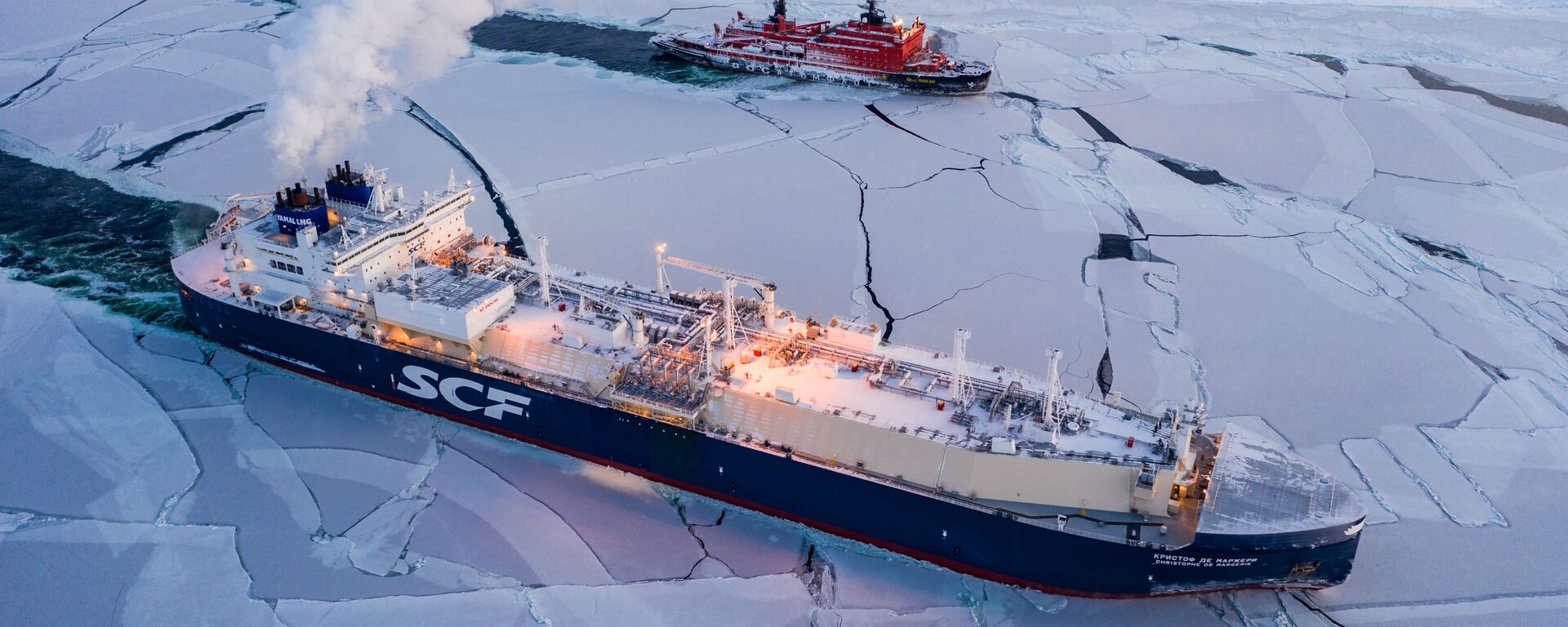
21 December 2023, 16:04 GMT
Western Options are Limited
On top of that, the West's capabilities of hindering Russia's flagship LNG projects are limited, according to Sputnik's interlocutor. Even though the EU Parliament has recently approved legal options to block Russian LNG imports to the Old Continent and the US has vowed to introduce new sanctions as well, other global players are continuing to boost energy cooperation with Moscow, the expert stressed.
"Thirty years ago, in 1994, when there was a US unipolar moment, the Americans could do almost anything in the world, and few people could withstand them," Mitrakhovich noted. "Now the situation has changed. There are countries that are acting independently on the world arena. These are Russia, China and India. And they can use their technologies, expand mutual trade, and so on. Therefore, America will not be able to completely stifle the independence of these countries," he pointed out.
Furthermore, Washington's aggressive actions on the world stage are accelerating the pace of rapprochement between major Eurasian players, the expert highlighted.
"The Chinese see how unceremoniously the Americans are acting. And in fact, all these American attacks against Russia are being actively studied in China. I think this will ultimately push the Chinese to focus more on cooperation with Russia instead of that with America," he said.
"I think that the [Russo-Chinese] project Power of Siberia-2 needs to be accelerated, because in the event of a mess in Taiwan the Americans could limit the supply of all sorts of commodities to China by sea. And if there is a pipe from Russia, [China wouldn't suffer from a possible energy blockade]. Russia's LNG exports could also be redirected to China (…) along the safe Northern Sea Route,"he said.
The West can throw sand in Russia's gears, but it cannot stop the nation's industrial and technological development based on its vast resources, expertise, and international links, the expert concluded.
